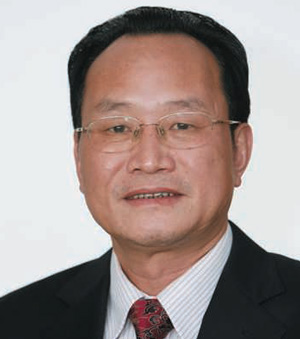新闻速递 & 外事动态
陈晓阳校长接受nature专访
来源:华南农业大学 发布时间:2017-12-20 浏览次数:1258 次
A conversation with DR. XIAOYANG CHEN, President, South China Agricultural University
Located in beautiful Guangzhou in southern China, also dubbed the ‘flower city’, South China Agricultural University (SCAU) is a national key university with roots in an agricultural training institute established in 1909. Specializing in tropical and subtropical agricultural studies, it is a multidisciplinary university, highly rated among its domestic counterparts. Here, the university president, Xiaoyang Chen, shares his plan to make SCAU a world-class university with unique strengths.

Dr. Xiaoyang Chen
President, South China Agricultural University
What are the strengths of SCAU?
SCAU is one of the 88 national key universities designated in 1979. Its genetic breeding of crops, pest control, agricultural economics and management, pomology, preventive veterinary and agricultural mechanic engineering are ranked as national key subjects. It leads China in research on issues of agriculture, farmers and rural areas, modern agricultural machinery technologies, cultivation of new tropical and subtropical plant varieties, husbandry of poultry and livestock, disease control, and food safety. According to the QS World University Rankings by Subject 2016, we are ranked among the global top 100 in agriculture and forestry. The Essential Science Index (ESI) data released in 2017 ranked SCAU 1454th globally and 5th domestically in overall strength.
What are your goals for future development?
Based in Guangdong Province, we aim to serve South China, meet national needs and to become a global presence. We need to further boost our overall capability and global competence, while enhancing our strengths in agricultural and life sciences. We want to make SCAU a world-renowned, high-profile university that features tropical and subtropical agriculture, while achieving balanced development of agriculture, engineering, humanities, natural sciences, economics, management and law. We want to be unique by constructing the first-class disciplines which characterize world-class universities.
How do you plan to achieve these goals?
We will focus on academic development of agricultural sciences, building world-class disciplines. Our academic programmes will be restructured and streamlined to better reflect the needs of modern agricultural development. We will boost traditional agricultural knowledge by emphasizing science and engineering programmes. Meanwhile, in response to the need for safe, nutritious and healthy food, we will concentrate on finding new drivers of agricultural industry and will enhance health and nutrition studies. In future, we also plan to integrate agriculture and medicine, establishing a health and life science institute to carry out research on preventive medicine, nutrition and healthcare services.
What are your innovations in student education?
An essential function of universities is student training. The core of our training is promoting innovation ability for doctoral students and emphasizing research capabilities for master’s students. In undergraduate education, focusing on quality improvement and structural optimization, we have implemented an innovation and entrepreneurship education model, encouraging students to identify questions themselves, take the initiative in learning, and to practice, enhancing their knowledge and skills. Students have learned to analyze issues and collaborate with others in the practice of innovation and entrepreneurship. The learning will guide their future development and enlighten their lives.
The learning will guide students’ future development and enlighten their lives.
We were designated a demo university for innovation and entrepreneurship education and were rated among the top 50 in education innovation among domestic universities by the Ministry of Education. In 2016, our student team was the second runner-up in the world final of the iGEM Competition, run by the International Genetically Engineered Machine (iGEM) Foundation.
How do you make SCAU go global?
It is generally agreed in domestic and international education communities that internationalization is the path to building prestigious universities. We are always open to globalization and seek to enhance our international reputation. We are broadening our international collaboration in education to train globally minded students. To internationalize our faculty teams, we have implemented policies to attract talented researchers from overseas and sent faculty members abroad for training. Capitalizing on our own strengths, we are also deepening research collaboration with high-profile international institutions and are building platforms for internationally collaborative innovation.
How does SCAU contribute to regional development?
With a mission to serve agricultural development, we are actively partnering with local enterprises to boost growth. An example is our collaboration with the Wens Foodstuffs Group, a livestock and poultry farming company in Guangdong, hailed as a role model of university-industry partnership among Chinese universities. We have established the Huanong Wens Research Institute, the National Engineering Research Center for Breeding Swine Industry and a national-local joint engineering research centre on livestock and poultry breeding, producing significant results on the breeding and healthy farming of domesticated animals. The Wens Foodstuffs Group has become the largest chicken farming company in Asia and one of the 10 largest swine farming enterprises globally.
Source: https://www.natureindex.com/supplements/nature-index-2017-science-inc/south-china-agricultural-university-scau



